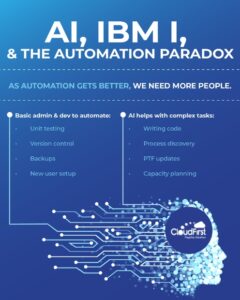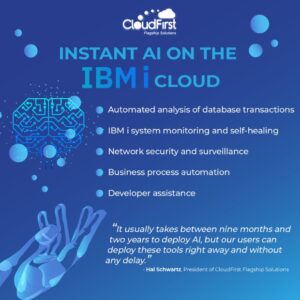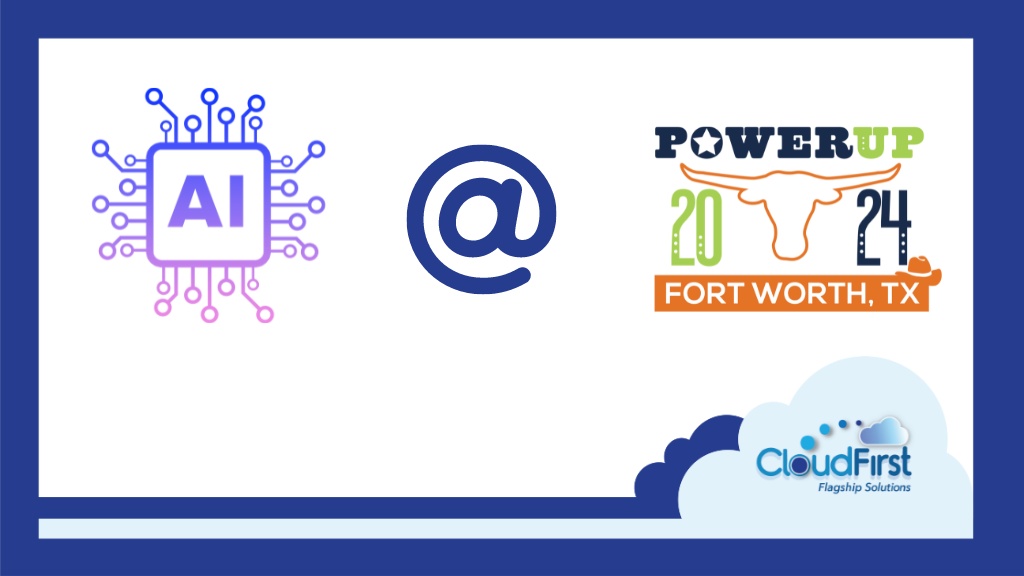In this year’s keynote address at COMMON’s annual POWERUp conference, we got a vision of what IBM i administration and development may look like in 2030. Of course, AI was front and center, but it was far from a sermon on how advanced automation is going to make us all obsolete.
In fact, it was quite the opposite.
In the picture painted by Puneet Kohli, President of Application Modernization at Rocket Software, the human touch will actually become even more important when working with IBM i technology.
There’s no denying that work has changed and that it will continue to change. The pandemic was a huge disruptive force, and many admins and developers who used to have to come to the office are now enjoying a commute that only asks them to traverse the distance from their breakfast table to their spare bedroom. At the same time, bosses are happy because overall productivity has increased.
All of this is to say that “the end of work as we know it” may have some bumps along the road, but overall what we find is that people adapt. What may have started out as a curse can turn into a blessing.
Current perceptions about AI in the IBM i ecosystem

There’s lots of anxiety around AI; people need answers. At the same time, the future is already here, so buckle up.
According to Microsoft’s 2024 Work Trend Index Annual Report, three out of four employees are already using AI at work. That same report found that “53% of people who use AI at work worry that using it on important work tasks makes them look replaceable.” They’re concerned that if they tell their boss they’re using AI, then they might lose their jobs.
“We’ve seen this before,” says Kohli.
The same story played out in the industrial revolution when machinery began to automate manufacturing. We also saw it in the information revolution with personal computers and the internet. In both cases, the number of overall jobs actually increased. That’s not to diminish the fact that people did experience pain as the labor market shifted, but the macro trend points to automation and technology leading to more jobs and better-paying jobs.
Gartner predicts that the overall impact of GenAI will result in half a billion net new jobs by 2036.
The takeaway is that AI will augment human workers, not replace us. It will handle mundane tasks and lead to both an expansion of complementary jobs and the creation of new ones.
Kohli calls this “the automation paradox.” He explains that “when you decide to automate a job or a process, the need for a human to be part of that becomes even more critical.”
The coexistence of AI with IBM i administrators and developers

What does this look like in practice?
It really depends on the complexity of the task. The simplest tasks may be automated altogether. For admins, this could be new user setup, logical partition provisioning, and backup and archiving. Developers may benefit from batch jobs, scripting, or source code version control.
In fact, a lot of this is already happening with traditional software automation. AI can and will make this more efficient.
Moving up on the complexity scale, we see admins having to deal with tasks like performance management and capacity planning. These are mission-critical for the organization, and it’s unlikely that smart businesses will ever trust AI enough to let them happen automatically. Sure, AI can pull, organize, and analyze data that admins can then use for their processes, but the final decisions come down to actual people.
That’s why so many organizations choose to work with a trusted cloud partner that keeps these experts on staff.
The same is true for developers doing process discovery. AI could help them get started or point them in the right direction, but this goes beyond automation alone.
Finally, we have the most complex tasks in the IBM i world, including performing PTF updates for administrators and writing code for developers. Again, AI can help—for instance by generating unit tests to help developers along—but we’re never going to see AI printing code from whole cloth.
“Writing code tests is mundane and repetitive, but it’s also crucial for building secure and performant software,” explains Chuck Paolillo, CTO at CloudFirst. “By offloading some of this work onto AI, developers can focus on solving hard problems and looking at the big picture. This makes them more productive while also making their job more enjoyable.”
Basically, AI isn’t going to steal your job. Yes, it may change it. But overall, what we’re going to see is an accelerated growth curve for junior engineers and admins to become senior ones. We’re going to see 10x programmers become 20x or 50x programmers. We’re going to see better technology and more of it.
Four things you can do right now to prepare for the AI wave

Kohli left us with four action items at the end of his keynote at COMMON POWERUp 2024. They all come out of asking yourself, “What can I be doing today that will help me tomorrow?” It’s an investment in yourself and your organization.
Automate now
AI is here. There are real business use cases, and it’s becoming easier than ever to add automation to your day. For instance, one innovation that stood out to us at this year’s conference was Profound Logic’s new Profound AI assistant. It takes less than an hour to set up, and users can start pulling insights from their company’s data in an instant.
Learn
Kohli wrapped up his talk with a fitting quote by Robert Greene: “The future belongs to those who learn more skills and combine them in creative ways.” Stay on top of advancements in the technology and get firsthand experience using it in low-pressure, low-stakes environments.
Convince your boss
If you’re in an organization where either your boss has prohibited AI use or you’re one of the 53% of employees who are afraid of looking replaceable, one of the best things you can do is start working on changing the perception. Set up a time for an honest discussion with your boss and share some of the information from this article or other points you learned at COMMON.
Be the driver of AI initiatives
This is your opportunity to shape the future. Make your voice heard so you can help create the world you want to live in.
Overall, this year’s COMMON POWERUp has been a great event. We loved attending so many enlightening sessions about AI, cybersecurity, cloud computing, and other hot topics in IBM i.
Most of all, we loved meeting with you, the community of admins, developers, and business leaders that motivate us to get up early every day to create the IBM Power cloud solutions you rely on. AI will definitely augment this community, but it certainly won’t ever be able to replace it.
Want to say hi? Get in touch with us today. We promise that a real flesh-and-blood human will get right back to you. We automate a lot of IT and maintenance tasks on our next-gen cloud platform, but we also know there are always going to be some things that are better with a personal touch.

